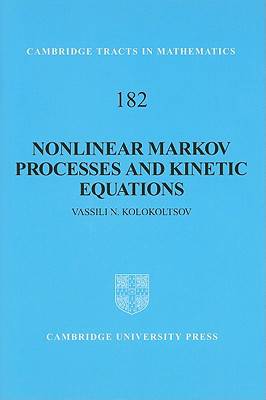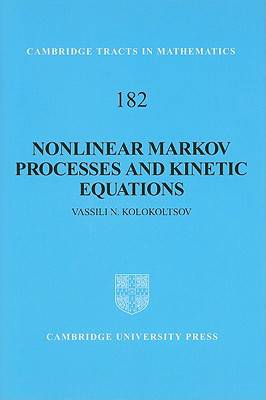
Bedankt voor het vertrouwen het afgelopen jaar! Om jou te bedanken bieden we GRATIS verzending (in België) aan op alles gedurende de hele maand januari.
- Afhalen na 1 uur in een winkel met voorraad
- Gratis thuislevering in België vanaf € 30
- Ruim aanbod met 7 miljoen producten
Bedankt voor het vertrouwen het afgelopen jaar! Om jou te bedanken bieden we GRATIS verzending (in België) aan op alles gedurende de hele maand januari.
- Afhalen na 1 uur in een winkel met voorraad
- Gratis thuislevering in België vanaf € 30
- Ruim aanbod met 7 miljoen producten
Zoeken
Omschrijving
A nonlinear Markov evolution is a dynamical system generated by a measure-valued ordinary differential equation with the specific feature of preserving positivity. This feature distinguishes it from general vector-valued differential equations and yields a natural link with probability, both in interpreting results and in the tools of analysis. This brilliant book, the first devoted to the area, develops this interplay between probability and analysis. After systematically presenting both analytic and probabilistic techniques, the author uses probability to obtain deeper insight into nonlinear dynamics, and analysis to tackle difficult problems in the description of random and chaotic behavior. The book addresses the most fundamental questions in the theory of nonlinear Markov processes: existence, uniqueness, constructions, approximation schemes, regularity, law of large numbers and probabilistic interpretations. Its careful exposition makes the book accessible to researchers and graduate students in stochastic and functional analysis with applications to mathematical physics and systems biology.
Specificaties
Betrokkenen
- Auteur(s):
- Uitgeverij:
Inhoud
- Aantal bladzijden:
- 394
- Taal:
- Engels
- Reeks:
- Reeksnummer:
- nr. 182
Eigenschappen
- Productcode (EAN):
- 9780521111843
- Verschijningsdatum:
- 15/07/2010
- Uitvoering:
- Hardcover
- Formaat:
- Genaaid
- Afmetingen:
- 152 mm x 229 mm
- Gewicht:
- 675 g

Alleen bij Standaard Boekhandel
+ 291 punten op je klantenkaart van Standaard Boekhandel
Beoordelingen
We publiceren alleen reviews die voldoen aan de voorwaarden voor reviews. Bekijk onze voorwaarden voor reviews.









